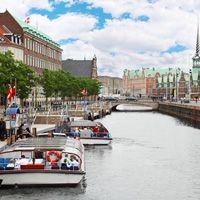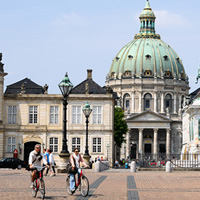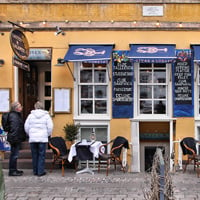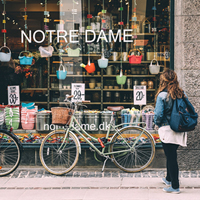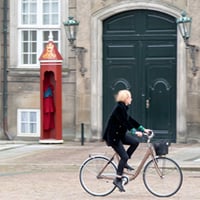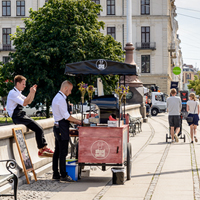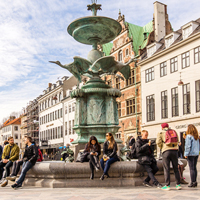Denmark
Coastal BeachesDenmark is a small, highly developed country located in Northern Europe. It is the southernmost of the Scandinavian nations, situated southwest of Sweden and south of Norway, and bordered to the south by Germany. The Kingdom of Denmark comprises Denmark proper and two autonomous constituent countries in the North Atlantic Ocean: the Faroe Islands and Greenland. Denmark itself is made up of the Jutland Peninsula and an archipelago of 443 named islands, with the largest being Zealand, Funen, and the North Jutlandic Island. The country enjoys a temperate climate marked by mild winters and cool summers. Denmark is known for its high standard of living, progressive social policies, and is often ranked as one of the happiest countries in the world. Its capital, Copenhagen, is known for its historic architecture, modern design, and a large biking culture. The Danish language is the official language, but English is widely spoken as a second language. The country has a mixed-market capitalist economy and ranks highly in metrics of national performance, including education, health care, protection of civil liberties, democratic governance, and LGBT equality. Denmark has a strong welfare state, with universal health care, higher education, and a comprehensive social security system. Denmark's history dates back to the Viking Age, and it has since evolved into a modern, prosperous nation. It is a founding member of NATO, the Nordic Council, the OECD, OSCE, and the United Nations. Denmark also maintains close ties with its Scandinavian neighbors through the Scandinavian Monetary Union. The Danish landscape is characterized by flat, arable land, sandy coasts, low elevation, and a temperate climate. While it does not have high mountains, the rolling hills and coastal dunes provide a variety of natural scenery. The country's environmental policies are among the most stringent in the world, aiming to ensure sustainability and preservation of its natural resources.
 AGS Worldwide Movers
AGS Worldwide MoversGet Quote
Relocating abroad soon? Make your move with AGS! AGS Worldwide Movers is a leader in the international moving industry. Our experience and expertise allows us to guarantee our clients the best quality moving services.
 AGS Worldwide Movers
AGS Worldwide MoversRelocating abroad soon? Make your move with AGS! AGS Worldwide Movers is a leader in the international moving industry. Our experience and expertise allows us to guarantee our clients the best quality moving services.
Get Quote
Living in Denmark
Best Places to Live in Denmark
Visa & Residency
Obtaining a residency in Denmark involves navigating a system that is designed to be straightforward but can be complex due to the specific requirements for each type of visa. The most popular visas for expats are the Greencard scheme, the Pay Limit scheme, and the Positive List scheme. The Greencard scheme allows highly skilled professionals to obtain a residence permit in search of work and subsequently work in Denmark. To qualify, applicants must score points based on criteria such as education, language skills, and adaptability. The Pay Limit scheme is for individuals who have been offered a highly paid job in Denmark, while the Positive List scheme is for those who have a job offer in a profession currently experiencing a shortage in Denmark. The process generally involves submitting an application and supporting documents to the Danish Service or the Danish Agency for International Recruitment and Integration. Applicants must also pay a processing fee. The difficulty of the process can vary depending on the applicant's circumstances and the specific visa type. For example, the Greencard scheme requires a substantial amount of documentation to demonstrate eligibility, and not all applicants will qualify for the points needed. Once a residence permit is granted, it typically allows the holder to stay in Denmark for up to 3 years, with the possibility of extension if they meet certain conditions, such as being employed in a job at a certain income level. It is important to note that Denmark does not currently offer a specific visa for digital nomads, so those working remotely often enter on a tourist visa or seek a residence permit through other available schemes. The tourist visa allows for stays of up to 90 days. For longer stays, digital nomads must navigate the standard work and residence permit application process, which can be more challenging without a traditional employer-based sponsorship.
Healthcare in Denmark
The system in Denmark is primarily public, funded through taxes and free at the point of use for all residents. It is known for its high quality and efficiency, with a strong emphasis on primary care and preventative measures. The system is decentralized, with the responsibility for hospitals and general practitioners falling to the regional governments. Private healthcare exists alongside the public system, offering services such as specialist treatments and elective surgeries, often with shorter waiting times. The cost of private healthcare is typically higher than public, but it is still affordable compared to many other countries. Expats and digital nomads can gain access to public healthcare once they are registered as residents and have a CPR number, which is a civil registration number provided by the Danish authorities. This registration also allows access to the European health insurance Card (EHIC), which provides health coverage throughout the European Union.
Cost of Living
The cost of living in Denmark is considered high, with expenses such as housing, transportation, and personal goods and services being significantly higher than in many other countries.
Weather
Denmark has a temperate maritime climate influenced by the North Atlantic Current. This means mild winters and cool summers with a moderate amount of precipitation throughout the year. The weather can be changeable, with overcast days being quite common. Winters can be windy and summers pleasantly warm, though rarely hot.
Educational System in Denmark
Denmark's educational system is renowned for its quality and emphasis on creating an environment conducive to learning and personal development. Education in Denmark is compulsory for children from the age of 6 to 16. The Danish education system is divided into different levels: pre-school, primary and lower secondary education, upper secondary education, and higher education. Pre-school, which is optional, caters to children from the age of six months to six years. Primary and lower secondary education are combined into one system known as the 'Folkeskole' which lasts for 10 years. After completing the 'Folkeskole', students can choose to continue their education by attending upper secondary school, which offers general education and prepares students for higher education, or they can enroll in vocational education programs. Upper secondary education typically lasts three years. Higher education in Denmark is offered at universities, university colleges, and academies of professional higher education, with programs that range from short-cycle higher education to doctoral degrees. Danish children typically start school in the year they turn six, and they graduate from upper secondary school around the age of 19. The Danish education system is characterized by a flexible structure, a broad curriculum, and a focus on both academic and social development. Schools in Denmark are well-equipped, and the teaching philosophy is often centered around student participation, critical thinking, and group work, rather than rote learning
Copyright 1997-2025 Burlingame Interactive, Inc.

